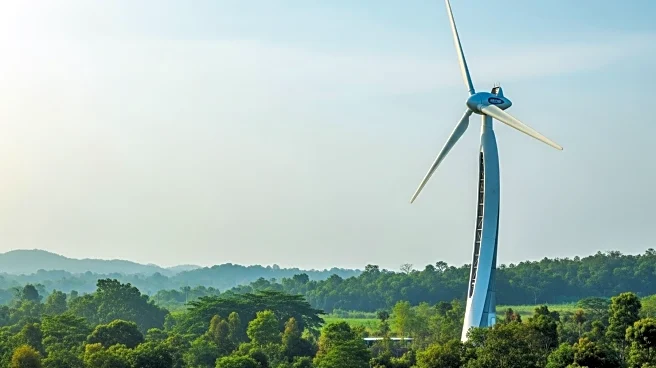What is the story about?
What's Happening?
Foreign direct investment (FDI) is increasingly being directed towards Southeast Asia and Africa, driven by China's significant push into green manufacturing. This shift is reshaping global economic landscapes, as traditional FDI flows to Europe, South America, and parts of Asia have declined. According to the United Nations Trade and Development (UNCTAD), FDI inflows to Africa surged by 75% to $97 billion, while Southeast Asia saw a 10% increase to $225 billion. The Gulf Cooperation Council countries have also expanded their economic footprint in Africa, investing $113 billion in logistics and infrastructure projects. China's focus on clean energy investments, including solar and wind power facilities, battery plants, and green-hydrogen start-ups, is enhancing its economic influence globally. These investments are largely driven by the search for market access and reliable raw material supplies, with private companies leading the charge rather than state-owned enterprises.
Why It's Important?
The shift in FDI patterns signifies a new phase in global economic expansion, particularly for China. This trend could accelerate the clean energy transition and reshape global trade dynamics. While Chinese investments have historically been viewed as threats to industrialization in recipient countries, the current wave of manufacturing FDI has the potential to strengthen domestic production, create jobs, and promote broader development goals. However, these investments also carry risks such as environmental degradation and labor exploitation. Host countries must adopt policies that ensure the benefits of FDI are broadly shared, emphasizing local production and knowledge transfer. The evolving FDI landscape could lead to significant changes in global economic power structures, with developing economies potentially gaining more influence.
What's Next?
As the full impact of these investments will become clear only in the coming years, advanced economies may be caught off guard by the changes. Host countries are increasingly imposing requirements on foreign investors to generate more domestic value-added production, inspired by Indonesia's approach to nickel processing. Governments are seeking to enhance local production and technology transfer, with companies like Lenovo establishing joint research and development departments in Brazil. However, stronger domestic regulation and regional cooperation are needed to ensure that the gains from FDI are widely distributed. The call for a fairer global economic order, reminiscent of the 1955 Bandung Conference, remains relevant as countries navigate these shifts.
Beyond the Headlines
The shift in FDI patterns highlights the need for a fairer international economic order, where investments serve societies rather than just shareholders. This requires governments to collaborate in developing markets that prioritize social benefits. The historical context of the Bandung Conference, which advocated for greater cooperation among Asian and African countries, underscores the importance of equitable economic development. As countries adapt to these changes, the focus should be on creating sustainable and inclusive growth that benefits all stakeholders.

















